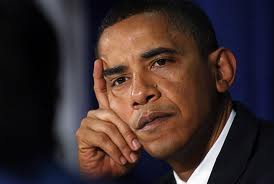 By MICHAEL FALCONE and AMY WALTER – March 14, 2011
By MICHAEL FALCONE and AMY WALTER – March 14, 2011
Just like that, President Obama finds himself in the midst of one of the most challenging periods of his presidency — and it could get a lot worse.
At home, the White House faces an ongoing debate over how to fund the government, how much to cut and which side — Democrats or Republicans — are going to blink first on the looming issue of entitlement reform.
Both parties on Friday seemed to come to an agreement on a three-week continuing resolution that would keep the government open while cutting about $6 billion. It would continue to fund the government when the current stop-gap bill expires on March 18.
“We can’t keep on running the government based on two-week extensions,” President Obama said last week. “That’s irresponsible.” Republicans have been using the issue to call the president’s leadership into question, arguing that he has been too hands-off in negotiations to solve the budget impasse.
“Look, we’re not going to shut down the government, we want the Democrats to step up,” Rep. Kevin McCarthy of California, a top House Republican, said in an interview with CNN yesterday. “You can’t negotiate with yourself.”
As the budget deal-making continues in Washington this week, the White House is facing growing pressure on a different front: how tough to get with Libya. Over the weekend, White House Press Secretary Jay Carney responded to the Arab League’s endorsement of a no-fly zone over Libya without specifically addressing whether the Obama administration would support it.
“We welcome this important step by the Arab League, which strengthens the international pressure on Gadhafi and support Libyan people,” Carney said. “The international community is unified in sending a clear message that the violence in Libya must stop and that the Gadhafi regime must be held accountable.”
But how far will the White House go and when? Libya is fast becoming a situation with profound political consequences here at home, as ABC’s Jonathan Karl noted on “This Week”: “If Gadhafi is still in power next year, if Libya is still a mess, this will be a central issue for Republicans. They will say this is Exhibit A of what happens when you have a foreign policy where America does not show leadership. You’re already seeing it with some on the Hill saying, look, the French are leading on this. Where is America?” .
And finally, the administration is facing another test in its response to the crisis in Japan. The U.S. was quick to send in aid, including navy ships, Marine forces, search and rescue teams and a variety of other assistance, but once again, there are lingering domestic consequences — namely a renewed debate over the safety of nuclear energy.
As the New York Times’ John Mr. Broder points out today, “Until this weekend, President Obama, mainstream environmental groups and large numbers of Republicans and Democrats in Congress agreed that nuclear power offered a steady energy source and part of the solution to climate change, even as they disagreed on virtually every other aspect of energy policy. … Now, that is all in question as the world watches the unfolding crisis in Japan’s nuclear reactors and the widespread terror it has spawned.” (Some lawmakers, including Sen. Joe Lieberman of Connecticut, are already calling on the U.S. to “put the brakes on” its nuclear power programs.)
BOTTOM LINE: While President Obama and his team want to keep focused on economy, jobs and today education (more on that below), events overseas are going to be consuming more of his attention. The events in Japan, unrest in Bahrain and Saudi Arabia and Libya also have huge impact on oil prices, which of course, brings us right back to the economy.






























